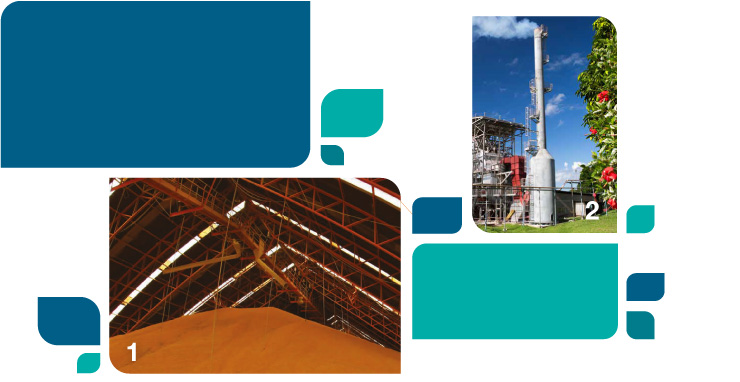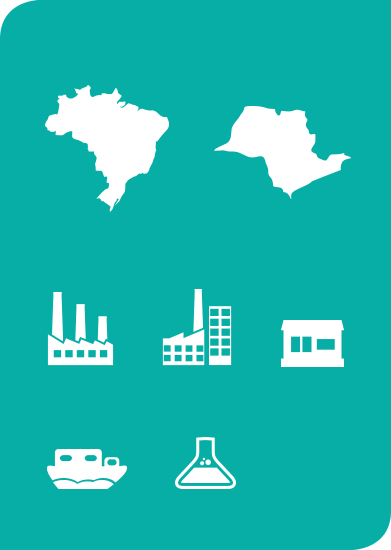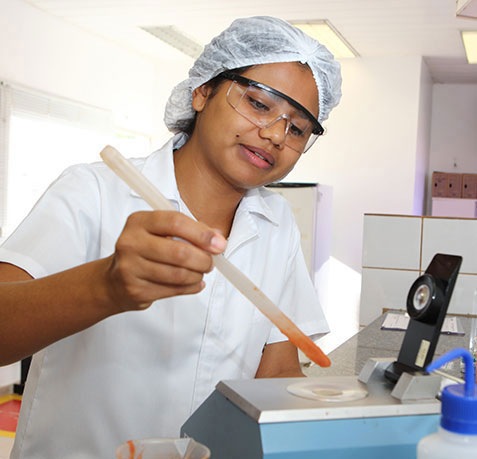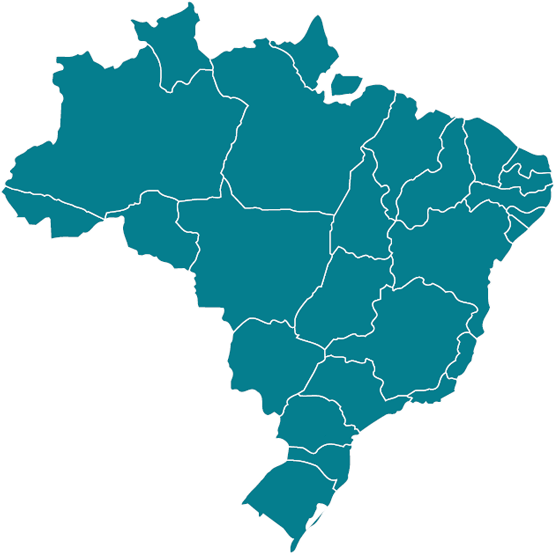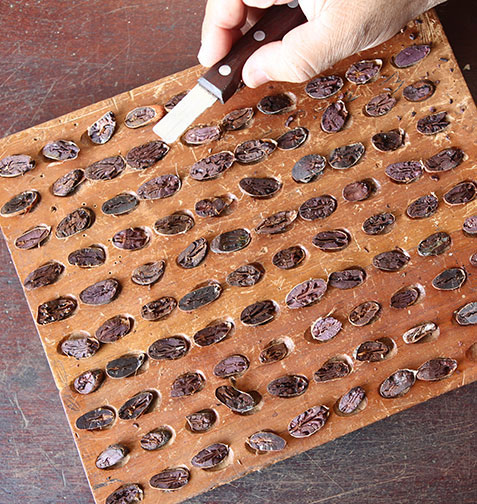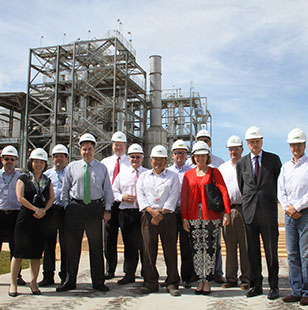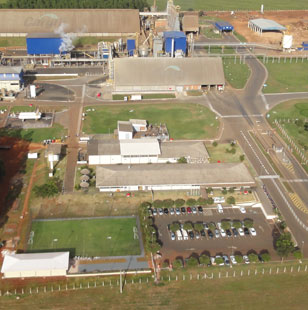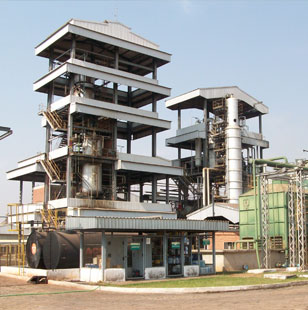-
 |
1965
Cargill now also speaks Portuguese
The first headquarters, in the Galeria Metrópole building in downtown São Paulo, was the Seeds Department office. At about the same time, we opened a small processing plant and a hybrid seed corn production facility in the city of Avaré (SP). |
Cargill now also speaks Portuguese
The first headquarters, in the Galeria Metrópole building in downtown São Paulo, was the Seeds Department office. At about the same time, we opened a small processing plant and a hybrid seed corn production facility in the city of Avaré (SP).
Cargill was one of the first companies to invest in bulk grain loading. To meet export demand, in 1967 the company started operations in the Port of Paranaguá (PR).
In the following year, to expand activities of the grain trading area, Cargill opened a branch office in Cascavel (PR). In 1968, the Feed Department started operating in Jacarezinho (PR).
The company’s feed business followed the growth of agribusiness up to 2008, with facilities in 10 municipalities of the states of São Paulo, Minas Gerais, Rio de Janeiro, Rio Grande do Sul, Paraná, Goiás, and Pernambuco.
-
1970
Geographic and business growth
As of the 1970s, Cargill diversified its operations in Brazil, building silos and new facilities for the feed, corn processing, and cattle feed supplement businesses in many cities of the South and Southeast regions.
-
1973
Cargill built its first plant in Brazil, in Ponta Grossa (PR), processing soybeans into refined oil and meal.
Cargill built its first plant in Brazil, in Ponta Grossa (PR), processing soybeans into refined oil and meal.
Fundação Cargill is established
Established in 1973, Fundação Cargill makes a difference in the communities where it is active, creatively engaging people and transforming society.
Over the course of 40 years, Fundação Cargill has published and distributed 249 books on the development of agricultural technologies applied to products that have helped Brazil become a leading player in the world economy. These books can be found in public libraries, schools, public organizations, and agricultural institutions.
Fundação Cargill has also been actively helping educational efforts in some Brazilian communities through two social programs. One is Fura-Bolo, offered from 1999 to 2011, and the other is “de grão em grão,” offered from 2004 to the present.
-
 |
1975
Innovation in the kitchen: Liza is born
This year was a milestone in the cooking oil market. Following its Veleiro brand soybean oil, Cargill innovated the cooking oil business by launching Liza, a product that did not release smoke or odors when heated. This represented a radical change for millions of people who cooked using animal fat and other types of oil. |
Innovation in the kitchen: Liza is born
This year was a milestone in the cooking oil market. Following its Veleiro brand soybean oil, Cargill innovated the cooking oil business by launching Liza, a product that did not release smoke or odors when heated. This represented a radical change for millions of people who cooked using animal fat and other types of oil.
To this day, Liza can be found in the kitchens of more than 30 million homes. It is the pride of Cargill and one of the most important brands in its portfolio.
-
1976
In the first half of 1976, Cargill ranked seventh among Brazil’s top 15 exporters. To meet consumer demand in the Southeast and Center-West regions, the company opened a soybean processing plant in Mairinque (SP).
-

1977
Cargill Brazil joins the global juice business
One of Cargill Brazil’s most important moves was joining the global citrus market.
Cargill Brazil joins the global juice business
One of Cargill Brazil’s most important moves was joining the global citrus market.
The acquisition of Citrobrasil, a company based in Bebedouro (SP), enabled Cargill to export concentrated and frozen orange juice, essential oils, concentrated pulp, and other citrus products used by the food industry to Europe, Asia, and North America.
Citrobrasil’s assets included processing plants; origination offices in Bebedouro, Uchôa, and Porto Ferreira (SP); a port terminal to ship frozen juice concentrate in Santos (SP); and three farms in the state of Minas Gerais, totaling over three million orange trees.
The citrus business helped Cargill become the first juice processor worldwide to earn an ISO 9002 certification, for its Bebedouro (SP) plant, which sold consumer products under the YES brand. In 2004, Cargill sold this operation to Citrosuco and Cutrale.
-
 |
1980
In order to keep growing, the time had come to start diversifying. For this reason, Cargill built its first cocoa processing plant in the world in Ilhéus (BA). By joining this business, the company expanded its portfolio and started selling cocoa liquor, butter, and powder to the food industry. |
-
1981
Cargill joined the international coffee market by acquiring Leon Israel Agrícola e Exportadora, one of the most traditional coffee exporters in Brazil, based in Santos. In 1998, Cargill expanded its footprint in this business by trading roasted and ground coffee under the Forte Aroma brand. In 2000, Cargill sold the business to Ecom Agroindustrial Corporation, a Swiss company in the cocoa commodities business.
-
1984
Cargill established its Financial Division to focus on risk and credit management as well as structured transactions.
-
1986
From soybeans to corn
In 1986, Cargill opened a state-of-the-art soybean processing plant in Uberlândia (MG). While at first the plant only processed soybeans, the facilities represented a major milestone in the history and technological development of Cargill in Brazil. In 1990, the Uberlândia complex gained a starches and sweeteners plant, and a citric acid plant in 2000.
From soybeans to corn
In 1986, Cargill opened a state-of-the-art soybean processing plant in Uberlândia (MG). While at first the plant only processed soybeans, the facilities represented a major milestone in the history and technological development of Cargill in Brazil. In 1990, the Uberlândia complex gained a starches and sweeteners plant, and a citric acid plant in 2000.
In early 2010, additional investment increased corn-processing capacity by 70 percent.
Today, the Uberlândia industrial complex is Cargill’s largest facility outside the United States.
In the 1980s, Cargill also entered the beef business when it acquired two meat processors, one in Maringá (PR) and the other in José Bonifácio (SP). Cargill was active in this market until 1987.
-
 |
1987
Cargill and its port operations
It was in this year that Cargill opened its port terminal in Guarujá (SP) to ship soybean grain, soybean pellets, and citric acid pellets. In 2009, Cargill and Louis Dreyfus formed a consortium that won the public bidding to operate the terminal for 25 years, renewable for another 25 years. |
Cargill and its port operations
It was in this year that Cargill opened its port terminal in Guarujá (SP) to ship soybean grain, soybean pellets, and citric acid pellets. In 2009, Cargill and Louis Dreyfus formed a consortium that won the public bidding to operate the terminal for 25 years, renewable for another 25 years.
Under the Terminal de Exportação de Açúcar (TEG) name, the consortium today exports a sizable share of Brazilian grain to many markets around the world.
About the same time, a joint venture between Cargill and Crystalsev started operating two sugar terminals. Terminal de Exportação de Açúcar do Guarujá (TEAG) ships bulk sugar, while Terminal T33, in the port of Santos, ships bagged sugar. The latter was sold to Grupo Libra in 2009.
-
1990
Cargill expanded its businesses and joined the crop nutrition industry. In 2004, an agreement between Cargill and IMC Global created Mosaic Fertilizantes, one of the world’s largest manufacturers of concentrate phosphate, nitrogen, and potash. In Brazil, the company held plants in Alto Araguaia (MT), Candeias (BA), Cubatão (SP), Monte Alto (SP), Paranaguá (PR), Rio Verde (GO), Sorriso (MT), and Uberaba (MG).
Cargill expanded its businesses and joined the crop nutrition industry. In 2004, an agreement between Cargill and IMC Global created Mosaic Fertilizantes, one of the world’s largest manufacturers of concentrate phosphate, nitrogen, and potash. In Brazil, the company held plants in Alto Araguaia (MT), Candeias (BA), Cubatão (SP), Monte Alto (SP), Paranaguá (PR), Rio Verde (GO), Sorriso (MT), and Uberaba (MG).
Cargill sold its worldwide equity interest in Mosaic in 2011 and left this market.
-
1993
Cargill established the Sugar Department to follow the growth of this market.
-
1994
The soybean business surged. Cargill leased a soybean processing plant in Barreiras (BA) from Olvebasa.
-
1996
Cargill entered the wheat milling business, in which it remained until 2008, by acquiring Moinho São Valentin, based in Tatuí (SP), the only Brazilian mill designed to process durum wheat, which is used to produce Italian-style pasta.
-
1997
Cargill acquired production, trading, and storage assets of Matosul in the states of Mato Grosso, Mato Grosso do Sul, and São Paulo as part of the growth and expansion strategy of the Soybean Complex. This acquisition was the beginning of operations for the Três Lagoas (MS) plant and of dozens of warehouses.
Cargill acquired production, trading, and storage assets of Matosul in the states of Mato Grosso, Mato Grosso do Sul, and São Paulo as part of the growth and expansion strategy of the Soybean Complex. This acquisition was the beginning of operations for the Três Lagoas (MS) plant and of dozens of warehouses.
It also represented a milestone in the expansion of farmland in the Brazilian Center-West region and in the company’s engagement with farmers.
This was when Cargill focused on the diversification of logistics to expand the grain business, a strategy the company has been pursuing to this day.
-
1998
In a worldwide transaction, Cargill, Inc. sold its seeds operations in 24 countries of Latin America, Europe, Asia, and Africa.
In a worldwide transaction, Cargill, Inc. sold its seeds operations in 24 countries of Latin America, Europe, Asia, and Africa.
A new Cargill takes shape
After more than 30 years in Brazil, the company was fully integrated into the Brazilian economy. It had become a diversified company with nationwide agribusiness operations, channeling investment, developing technologies, processing agricultural commodities, and helping develop technologies for the food industry.
It also shifted from a mere commodity trader to a company engaged in finding solutions for its customers.
In a letter to its employees, the company stated:
"For Cargill, change is not an option, it is vital. The pace of transformations taking place around the world has been faster than Cargill’s internal pace, something that should happen under no circumstances. We are starting today a phase of deep renovation of this great company, which will certainly lead to continuous and dynamic change."
The motto that would guide this restructuring was: create value for our customers.
-
 |
2000
To improve financial transactions and offer distinct credit services to farmers, the company established Banco Cargill in Brazil. |
To improve financial transactions and offer distinct credit services to farmers, the company established Banco Cargill in Brazil.
In the same year, Cargill started operations of the Industrial Oils and Lubricants Business Unit.
In this same decade, Cargill started to market well-known consumer brands, such as La Española, Purilev, Olivia, Mazola, Gallo, and Maria.
-
2001
The company opened a modified starches plant in São Miguel do Iguaçu (PR), which remained in activity until 2015.
-
2002
To keep pace with the world, the company announced its new brand strategy and new logo to reflect this new strategy.
Using the “A new Cargill is taking shape” slogan, the strategy was designed to help customers of the agricultural and food supply chains succeed.
-
2003
Cargill opened its river port terminal in Santarém (PA), a visionary milestone in Cargill logistics that would provide a solution to ship grain from Brazil’s Center West and North regions.
In the same year, in partnership with The Nature Conservancy (TNC), an NGO, Cargill created the More Sustainable Soybean Project to ensure responsible soybean farming in the state of Pará and to reduce deforestation.
-
 |
2004
The company acquired the Seara brand and joined the poultry and pork businesses. This led Cargill to be the only company worldwide at the time to have meat operations in all continents. Additionally, it expanded operations in the Brazilian market with a strong marketing strategy for processed products, such as sausages. The business had nine plants in the states of Mato Grosso do Sul, São Paulo, Paraná, and Santa Catarina. Cargill sold this division in 2009. |
The company acquired the Seara brand and joined the poultry and pork businesses. This led Cargill to be the only company worldwide at the time to have meat operations in all continents. Additionally, it expanded operations in the Brazilian market with a strong marketing strategy for processed products, such as sausages. The business had nine plants in the states of Mato Grosso do Sul, São Paulo, Paraná, and Santa Catarina. Cargill sold this division in 2009.
Also in 2004, the company built a plant in Rio Verde (GO), which processed soybeans into degummed oil and meal for animal feed. Construction also started on a refined soybean oil refinery and bottling plant for end consumers.
Major acquisitions and construction
Cargill made important acquisitions that year, including Smucker do Brasil, a subsidiary of J.M. Smucker Company and one of the main suppliers of food ingredients in Brazil. The transaction included Smucker’s plants in São José do Rio Pardo (SP) and Cosmópolis (SP). The latter was sold in 2011, when Cargill exited the global aroma business.
Cargill also bought the vegetable fats business from the Maeda Group, thus starting operations at the Itumbiara (GO) site.
-
 |
2005
Cargill restructured the cotton business in Brazil, which included origination, logistics, storage, and marketing activities. The company also acquired a plant in Porto Ferreira (SP), which produces ingredients used in the food industry, and as of 2007 started producing industrial chocolates and compounds. |
-
2006
Cargill entered the sugar and ethanol production business through an equity stake in Central Energética Vale do Sapucaí Ltda. (CEVASA).
-
 |
2009
Under its new perspective, Cargill opened a soybean processing plant in Primavera do Leste (MT) to refine and bottle Liza brand cooking oil using the best environmental practices. |
-
2011
Cargill innovated by diversifying its portfolio. After acquiring Unilever’s tomato business in Brazil, it included the Pomarola, Tarantella, Elefante, and Pomodoro brands in its portfolio, took over the largest tomato processing plant in Latin America, based in Goiânia (GO), and expanded its operations in Brazilian retail.
Cargill innovated by diversifying its portfolio. After acquiring Unilever’s tomato business in Brazil, it included the Pomarola, Tarantella, Elefante, and Pomodoro brands in its portfolio, took over the largest tomato processing plant in Latin America, based in Goiânia (GO), and expanded its operations in Brazilian retail.
During this same time, Cargill Foods Brazil announced Programa Renove o Meio Ambiente (Renew the Environment Program), which provides consumers with alternatives to properly discard used cooking oil. The oil collected is processed into biodiesel, produced from a clean and renewable source.
The program today already has over 500 drop-off locations in the states of São Paulo, Minas Gerais, Rio de Janeiro, Goiás, Rio Grande do Sul, and Paraná.
Biofuels
The company expanded its presence in the sugar and ethanol market through SJC Bioenergia, a joint venture with the USJ Group. Operations take place in mills located in the municipalities of Quirinópolis and Cachoeira Dourada (GO). In 2012, the company grew in the biofuel market when it started producing biodiesel in Três Lagoas (MS).
Campinas (São Paulo) now hosts the Latin America Innovation Center, a location that innovates and develops solutions for the food and beverage industries, in addition to being a venue for events and business.
The site combines laboratories serving the food, beverage, food service, retail products, and industrial starches industries.
In a 2011 worldwide transaction, Cargill acquired Provimi, a global leader in animal nutrition. In Brazil, Provimi operated under the Nutron brand, with plants in Campinas (SP), Chapecó (SC), Itapira (SP), and Toledo (PR).
The Nutron name was changed in 2014 to Cargill Alimentos and became a benchmark in animal nutrition. Today, the business is part of the Cargill Animal Nutrition (CAN) platform, a world leader active in 36 countries.
-
2013
Cargill joined the More Sustainable Cocoa Project in partnership with the Cocoa Crop Plan Executive Committee (CEPLAC), The Nature Conservancy (TNC), an NGO, and the Alternative Cooperative of Smallholders and Urban Farmers of São Félix do Xingu (CAPPRU), in the state of Pará. The project encourages economically feasible reclamation of environmentally degraded areas, and promotes compliance with environmental regulations by smallholders in the area of São Félix do Xingu (PA). The initiative will benefit 100 direct farmers and about 900 indirect farmers by planting 500 new hectares of cocoa.
Cargill joined the More Sustainable Cocoa Project in partnership with the Cocoa Crop Plan Executive Committee (CEPLAC), The Nature Conservancy (TNC), an NGO, and the Alternative Cooperative of Smallholders and Urban Farmers of São Félix do Xingu (CAPPRU), in the state of Pará. The project encourages economically feasible reclamation of environmentally degraded areas, and promotes compliance with environmental regulations by smallholders in the area of São Félix do Xingu (PA). The initiative will benefit 100 direct farmers and about 900 indirect farmers by planting 500 new hectares of cocoa.
A new promise and expression of the corporate brand was introduced: thrive. Thrive represents a state of vigorous growth and sustainable success; it manifests the desire for progress and prosperity of all around the globe. Cargill thus strives to be a preferred company, globally consisting and locally relevant, growing and developing together with all of its stakeholders.
-
2014
Cargill opened its new corn processing plant in Castro, PR, to produce starches and sweeteners.
This is Cargill’s first plant in Brazil under the innovative biorefinery concept, which combines installations, equipment, and processes to convert biomass into refined products in partnership with other companies around the site.
Cargill opened its new corn processing plant in Castro, PR, to produce starches and sweeteners.
This is Cargill’s first plant in Brazil under the innovative biorefinery concept, which combines installations, equipment, and processes to convert biomass into refined products in partnership with other companies around the site.
Additionally, Cargill and Copersucar formed Alvean, the world’s largest sugar trader.
This joint venture combines decades of experience, knowledge of the global market, and integrated logistics to offer the best service to sugar customers and suppliers around the world.
Also in 2014, Cargill opened the Shared Services Center in Uberlândia (MG). This operation is part of Cargill’s global strategy of combining transactional services in the areas of information technology, human resources, finances, procurement, transportation, and logistics.
-
2015
Over its 50-year history in Brazil, Cargill has earned the pride of Brazilians and of people around the world. The company has believed in the country's growth potential and in the potential of its farming and food industries.
Click here to know more about Cargill’s history worldwide.
Over its 50-year history in Brazil, Cargill has earned the pride of Brazilians and of people around the world.
The company has believed in the country's growth potential and in the potential of its farming and food industries.
Cargill’s products are present in the daily lives of millions of people, nourishing the dream of a better tomorrow.
In an ever-growing world, Cargill is committed to responsibly and affordably feeding people with the lowest environmental impact.
Brazil plays a key role in this process.
It is time to start a new phase, facing the challenges that are yet to come and ensuring that more and more people have access to quality food.
You also play a key role in this history, writing every new chapter together with Cargill.

